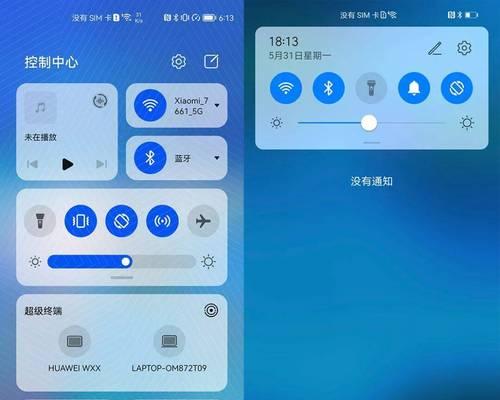 Mobile Tutorial
Mobile Tutorial
 Android Phone
Android Phone
 HarmonyOS and Android (explore the differences and similarities between the two operating systems)
HarmonyOS and Android (explore the differences and similarities between the two operating systems)
HarmonyOS and Android (explore the differences and similarities between the two operating systems)
php editor Baicao will introduce to you the differences and similarities between the two operating systems HarmonyOS and Android. HarmonyOS is a distributed operating system independently developed by Huawei, aiming to provide a more unified and intelligent user experience. Android is a mobile operating system developed by Google and is currently the most widely used in the world. This article will compare the architecture, application ecology, developer support and other aspects of the two to help readers better understand their characteristics, advantages and disadvantages. Whether you are a developer interested in technology or a regular user with questions about smartphone operating systems, this article will provide you with valuable information.

1. Operating system background and development trend:
1.1 Background and characteristics of HarmonyOS
and make up for some of the disadvantages of traditional operating systems Shortcomings: Seamless full-scenario experience, committed to building an intelligent system, HarmonyOS is an operating system independently developed by Huawei.

1.2 Background and characteristics of Android
Its openness and ecosystem have been recognized by the majority of users, and it has become one of the most mainstream smartphone operating systems in the world. 1. Android is a mobile operating system developed by Google.
2. User interface and interaction method:
2.1 HarmonyOS user interface design

enables users to better customize their use experience, and provides richer animation effects and personalized settings. The user interface of HarmonyOS is intuitive and simple.
2.2 Android user interface design
Widgets, etc., Android provides a diverse user interface, but some older versions have problems of insufficient smoothness and consistency, allowing users to customize Define desktop and icons.
3. Application ecosystem:
3.1 HarmonyOS application ecosystem
and provides a rich selection of applications in the application store. HarmonyOS supports multi-terminal development, which can be Write multi-terminal adaptations at once, thereby improving developer efficiency.
3.2 Android’s application ecosystem
The number of applications is numerous and diverse. Android has a large and complete application ecosystem that meets users’ needs for different types of applications.
4. System fluency and performance:
4.1 The system fluency of HarmonyOS
also has lower power consumption, better task scheduling and resource management capabilities , the system runs more smoothly, HarmonyOS adopts a distributed architecture.
4.2 Android’s system fluency
has significantly improved its fluency, but in recent years Google has optimized and improved it. Android had some system lags in the past and unstable performance issues.
5. Security and privacy protection:
5.1 Security and privacy protection of HarmonyOS
Secure communication to protect users’ data security and privacy rights, privacy protection, etc. HarmonyOS introduces a series of security mechanisms, including a secure kernel.
5.2 Security and Privacy Protection of Android
Because its openness has led to the risk of malware in some applications, the security of Android is highly controversial, and the privacy protection of personal data also exists. Certain problem.
6. System update and support:
6.1 HarmonyOS system update mechanism
Users can update according to their own needs. HarmonyOS adopts a modular design idea, making System updates are more convenient and flexible.
6.2 Android system update mechanism
Some devices cannot obtain the latest version of system updates in time, resulting in slow system updates. Android is fragmented due to different manufacturers and different devices.
7. Hardware Adaptation and Ecological Integration:
7.1HarmonyOS Hardware Adaptation Capabilities
For example, mobile phones, HarmonyOS supports multiple device types and provides unified development Tools and frameworks, tablets, facilitate developers to carry out hardware adaptation, smart wear, etc.
7.2 Android’s hardware adaptation capabilities
and provides good support for hardware from different manufacturers. Android has a wide range of hardware adaptation capabilities, covering almost most smart devices on the market. .
8. Ecological cooperation and developer support:
8.1 HarmonyOS’ ecological cooperation and developer support
also provides developers with rich development resources and technical support, and Partners from various industries work together to build an ecosystem, and HarmonyOS actively promotes ecological cooperation.
8.2 Android’s ecological cooperation and developer support
Documents and communities, including the developer platform, Google provides developer support, and the Android ecosystem is relatively mature.
9. Artificial Intelligence Technology and Experience:
9.1 HarmonyOS’s Artificial Intelligence Technology and Experience
Such as intelligent voice assistant, smart home control, etc., providing smarter and more convenient For user experience, HarmonyOS incorporates artificial intelligence technology.
9.2 Android’s artificial intelligence technology and experience
Users can complete a series of operations through voice commands, such as Google Assistant, etc. Android has also made breakthroughs in artificial intelligence technology.
10. User experience and personalized customization:
10.1 The user experience and personalized customization of HarmonyOS
fonts, meet the different aesthetic needs of users, lock screen styles, etc., provide more With many personalization options, HarmonyOS focuses on user experience, such as themes.
10.2 User experience and personalized customization of Android
Users can adjust the display effect of the system according to their own preferences. Android provides a wealth of personalized setting options, sounds, etc.
11. Compatibility and migration cost:
11.1HarmonyOS compatibility and migration cost
And it can run on Huawei devices and Android devices at the same time, reducing development To reduce migration costs, HarmonyOS supports seamless migration of Android applications.
11.2 Android compatibility and migration cost
However, the migration cost is relatively high, and the Android system has good compatibility, especially migration between different versions.
12. Battery life and power consumption management:
12.1HarmonyOS’s battery life and power consumption management
extends the use time of the device through intelligent scheduling algorithms and low Power consumption mode and other technical means, HarmonyOS has optimized battery life and power consumption management.
12.2 Battery life and power consumption management of Android
The background running and poor optimization of some applications will cause the battery to drain quickly. Android has certain challenges in battery life and power consumption management. .
13. System stability and failure rate:
13.1 System stability and failure rate of HarmonyOS
The system has high stability and can ensure the normal user experience. , the failure rate is relatively low, and HarmonyOS has been tested and optimized many times.
13.2 Android system stability and failure rate
Although Google has been working hard to improve, Android has some stability problems, which still need to be improved. System crashes and other situations, including application crashes .
14. System openness and freedom:
14.1 HarmonyOS system openness and freedom
encourages developers to participate in the development and optimization of the system, providing more With great freedom, HarmonyOS adopts an open source approach.
14.2 Android’s system openness and freedom
Allows developers to freely carry out secondary development and customization and enjoy a higher degree of freedom. Android is an open source operating system.
Fifteen,
Application ecology, we can see that the two have similarities in the user interface, system fluency, and security by comparing and contrasting HarmonyOS and Android. There are some differences in aspects such as this. Users need to make choices based on their own needs and preferences, and get the best experience when choosing an operating system.
The above is the detailed content of HarmonyOS and Android (explore the differences and similarities between the two operating systems). For more information, please follow other related articles on the PHP Chinese website!

Hot AI Tools

Undresser.AI Undress
AI-powered app for creating realistic nude photos

AI Clothes Remover
Online AI tool for removing clothes from photos.

Undress AI Tool
Undress images for free

Clothoff.io
AI clothes remover

AI Hentai Generator
Generate AI Hentai for free.

Hot Article

Hot Tools

Notepad++7.3.1
Easy-to-use and free code editor

SublimeText3 Chinese version
Chinese version, very easy to use

Zend Studio 13.0.1
Powerful PHP integrated development environment

Dreamweaver CS6
Visual web development tools

SublimeText3 Mac version
God-level code editing software (SublimeText3)

Hot Topics
 1378
1378
 52
52
 How to restore the original appearance of mobile phone desktop icons (easily solve the problem of mobile phone desktop icon confusion)
Sep 02, 2024 pm 03:05 PM
How to restore the original appearance of mobile phone desktop icons (easily solve the problem of mobile phone desktop icon confusion)
Sep 02, 2024 pm 03:05 PM
In the process of daily use of mobile phones, we often encounter the situation where the mobile phone desktop icons are messed up, which bothers us. However, with some simple operations, we can easily restore the original appearance of the mobile phone desktop icons. This article will introduce some effective methods to solve this problem. Back up desktop layout Before restoring mobile phone desktop icons, we first need to back up the current desktop layout. Open the phone settings, find the "Desktop and Wallpaper" option, then click the "Backup and Restore" button, select "Backup Desktop Layout", and the phone will automatically save the current desktop layout. Use the icon manager that comes with the system. Most mobile phone systems provide the icon manager function, which can help us restore mobile phone desktop icons. Open your phone settings and find "Apps & Notifications"
 How to deactivate the safety mode of oppo mobile phones (quickly and easily deactivate the safety mode of oppo mobile phones)
Sep 02, 2024 pm 03:38 PM
How to deactivate the safety mode of oppo mobile phones (quickly and easily deactivate the safety mode of oppo mobile phones)
Sep 02, 2024 pm 03:38 PM
In some cases, your Oppo phone may enter safe mode, resulting in the inability to use the phone's functions normally. In this situation, you may feel confused and anxious. However, don't worry! This article will introduce you to some quick and easy methods to disable the safe mode of your Oppo phone and let you use your phone again. 1. Check the battery power If the battery power of your OPPO phone is too low, it may cause the phone to automatically enter safe mode. Please make sure your phone is fully charged and try restarting your phone. Press and hold the power button In some cases, OPPO phones can exit safe mode by long pressing the power button. Try holding down the power button for a few seconds to see if you can exit safe mode. Check the volume keys Sometimes, pressing the wrong combination of volume keys will also
 Steps and precautions for registering a Hong Kong Apple ID (enjoy the unique advantages of the Hong Kong Apple Store)
Sep 02, 2024 pm 03:47 PM
Steps and precautions for registering a Hong Kong Apple ID (enjoy the unique advantages of the Hong Kong Apple Store)
Sep 02, 2024 pm 03:47 PM
Apple's products and services have always been loved by users around the world. Registering a Hong Kong Apple ID will bring more convenience and privileges to users. Let’s take a look at the steps to register a Hong Kong Apple ID and what you need to pay attention to. How to register a Hong Kong Apple ID When using Apple devices, many applications and functions require using Apple ID to log in. If you want to download applications from Hong Kong or enjoy the preferential content of the Hong Kong AppStore, it is very necessary to register a Hong Kong Apple ID. This article will detail the steps on how to register a Hong Kong Apple ID and what you need to pay attention to. Steps: Select language and region: Find the "Settings" option on your Apple device and enter
 Solution to the problem of blurry screen on Samsung monitor (how to deal with the phenomenon of blurry screen on Samsung monitor)
Sep 04, 2024 pm 01:32 PM
Solution to the problem of blurry screen on Samsung monitor (how to deal with the phenomenon of blurry screen on Samsung monitor)
Sep 04, 2024 pm 01:32 PM
With the continuous development of technology, monitors have become an indispensable part of people's daily life and work. However, sometimes we may encounter some problems, such as screen blur on Samsung monitors. This article will introduce some common solutions to help you better deal with this problem. 1. Check whether the connection cable is secure - make sure the VGA, DVI or HDMI cables are intact and firmly connected to the monitor and computer or other devices. - Check whether the interface of the connecting cable is loose or dirty, and clean or replace it if necessary. 2. Adjust resolution and refresh rate - Adjust the resolution and refresh rate of the monitor on your computer system to ensure it matches the monitor's default settings. - Try different settings to see if they can resolve the blurry screen issue.
 How to identify genuine and fake shoe boxes of Nike shoes (master one trick to easily identify them)
Sep 02, 2024 pm 04:11 PM
How to identify genuine and fake shoe boxes of Nike shoes (master one trick to easily identify them)
Sep 02, 2024 pm 04:11 PM
As a world-renowned sports brand, Nike's shoes have attracted much attention. However, there are also a large number of counterfeit products on the market, including fake Nike shoe boxes. Distinguishing genuine shoe boxes from fake ones is crucial to protecting the rights and interests of consumers. This article will provide you with some simple and effective methods to help you distinguish between real and fake shoe boxes. 1: Outer packaging title By observing the outer packaging of Nike shoe boxes, you can find many subtle differences. Genuine Nike shoe boxes usually have high-quality paper materials that are smooth to the touch and have no obvious pungent smell. The fonts and logos on authentic shoe boxes are usually clear and detailed, and there are no blurs or color inconsistencies. 2: LOGO hot stamping title. The LOGO on Nike shoe boxes is usually hot stamping. The hot stamping part on the genuine shoe box will show
 Choose the best video player software (compare the pros and cons of different video player software)
Sep 02, 2024 pm 03:03 PM
Choose the best video player software (compare the pros and cons of different video player software)
Sep 02, 2024 pm 03:03 PM
With the popularity of the Internet and smart devices, video has become an indispensable part of people's daily lives. When choosing a video player software, we hope that it can provide a good user experience, stable playback performance, and support a variety of common video formats. This article will introduce several well-known video player software currently on the market, and evaluate them based on their functions and features, so that readers can choose the software that best suits their needs. 1. Introduction and comparison of popular video player software Windows Media Player: easy to use, comes with Windows system, supports common formats, limited functions VLC Media Player: powerful decoding capabilities, widely supports various formats, simple interface PotPlayer: highly customizable Support multiple formats
 How to check WiFi password on Android phone (simple operation allows you to easily obtain the password of the connected WiFi)
Sep 02, 2024 pm 05:10 PM
How to check WiFi password on Android phone (simple operation allows you to easily obtain the password of the connected WiFi)
Sep 02, 2024 pm 05:10 PM
With the popularity of wireless networks, we often connect to different WiFi networks, but sometimes we forget the password of a certain WiFi network. This article will introduce how to check the password of the connected WiFi on an Android phone, so that you can easily obtain and record it. Paragraph 1. Enter the WiFi settings page through system settings. Enter the WiFi settings page by clicking the "WiFi" option in the phone settings. 2. Select the connected WiFi network. In the WiFi settings page, find and click the name of the connected WiFi network. 3. Enter the WiFi network details page. In the pop-up window, click "Network Details" or similar options to enter the WiFi network details page. 4. Display the high speed of the connected WiFi
 How to clean colored silicone mobile phone cases (simple and practical cleaning tips and precautions)
Sep 02, 2024 pm 04:09 PM
How to clean colored silicone mobile phone cases (simple and practical cleaning tips and precautions)
Sep 02, 2024 pm 04:09 PM
Colored silicone phone cases are one of the common accessories for modern mobile phone enthusiasts. However, after a period of use, dirt and dust will inevitably accumulate on the phone case, affecting its appearance and hygiene. How to properly clean colored silicone phone cases is something every mobile phone user should know. This article will introduce you to some simple and practical cleaning tips and precautions to help you clean colored silicone phone cases easily. 1. Preparation before cleaning Before cleaning, first make sure that the phone is turned off and separate the phone from the phone case. Then prepare the following tools: a soft-bristled brush, mild detergent, warm water, and a clean towel. 2. Use a soft-bristled brush to remove most of the dust. Use a soft-bristled brush to gently brush off most of the dust on the surface of the colored silicone phone case. You can place the phone case on a paper towel to prevent the dust from scattering. want



